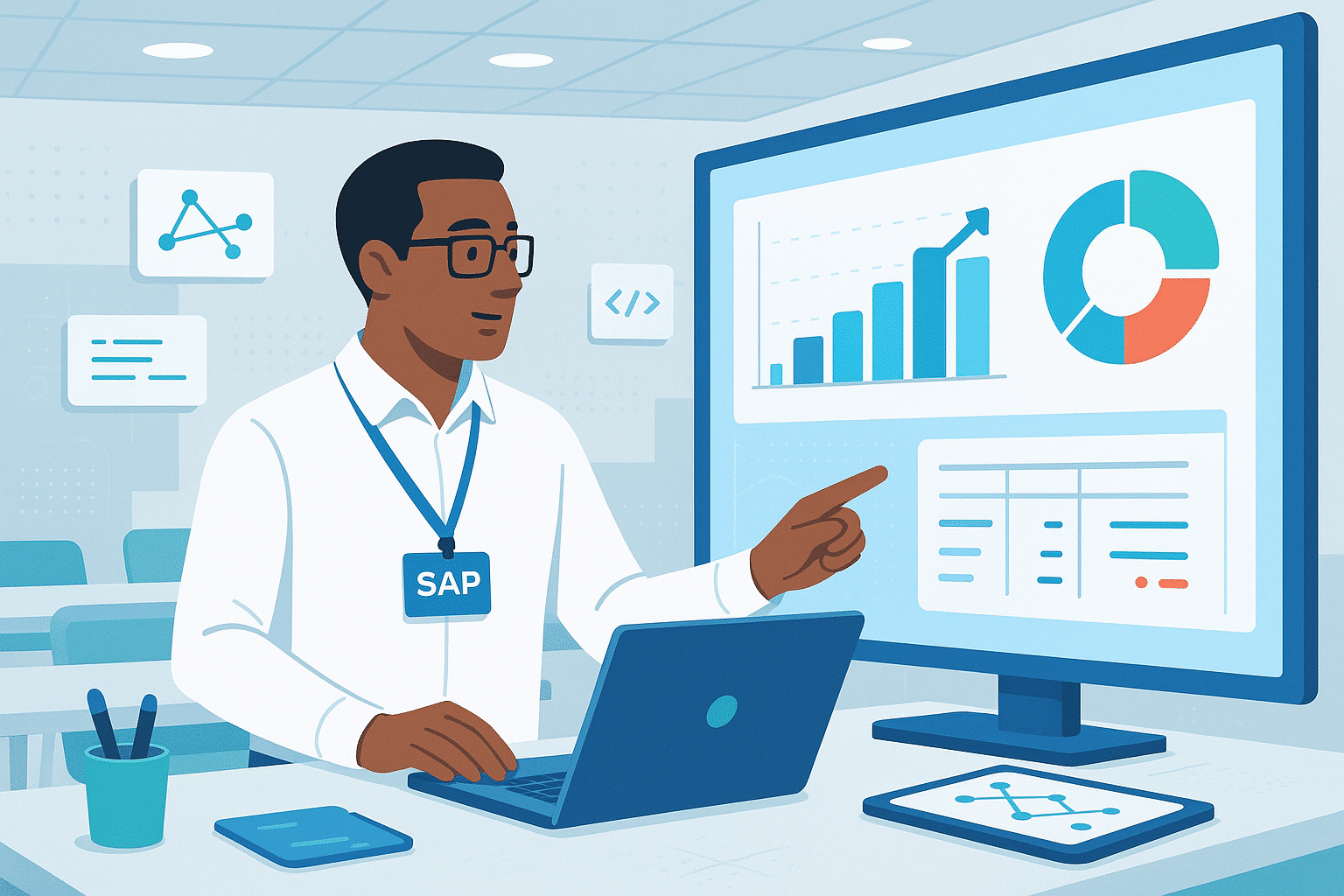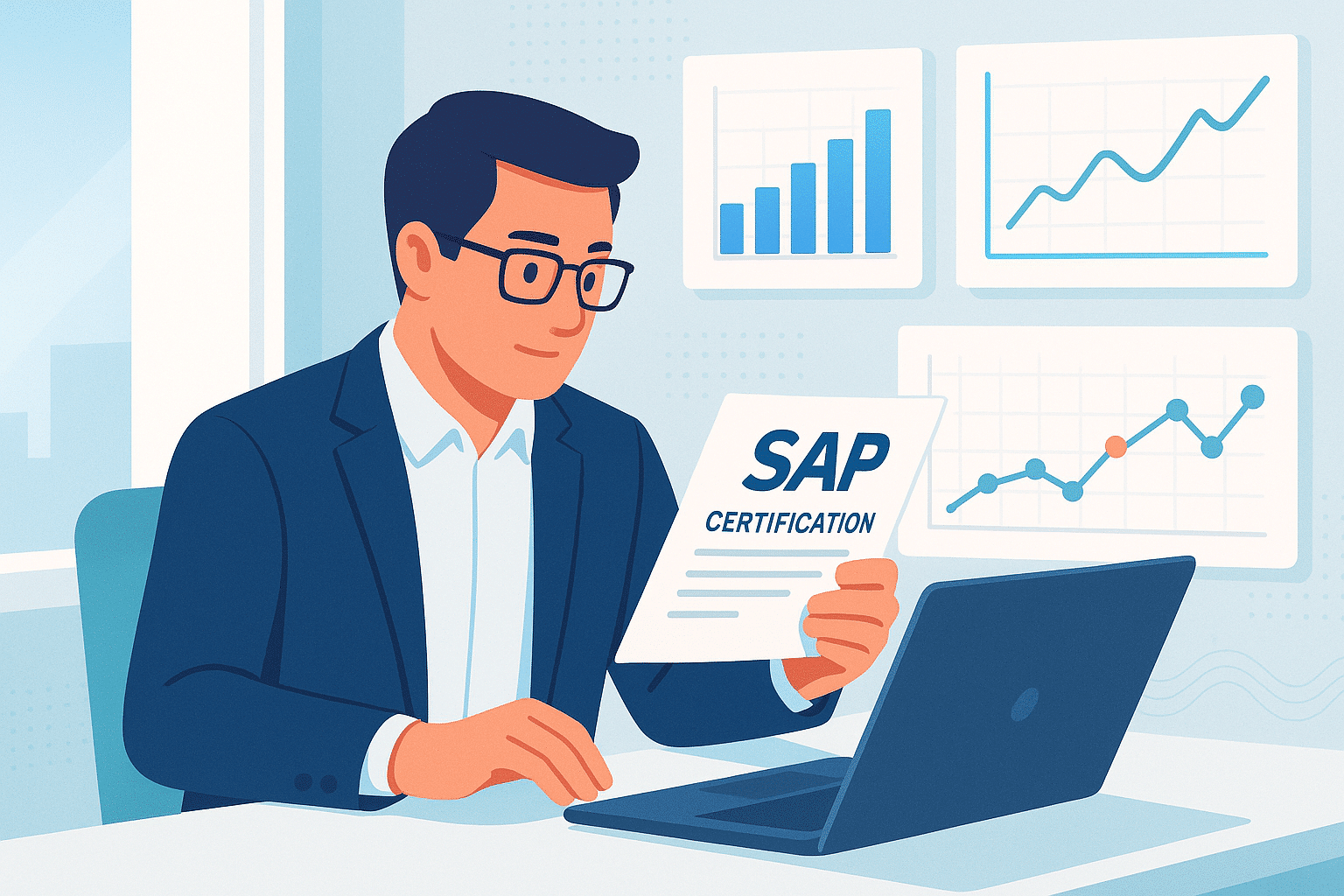Are you looking to advance in the ERP world, enhance your professional profile, or transition to a future-proof career? SAP certification is a valuable recognition that opens up numerous opportunities, both within France and internationally. In this guide, discover everything you need to know to choose, prepare for, and successfully pass your certification, regardless of your level.
What is a SAP certification?
SAP: defining the software and its uses
Do you often hear about SAP without fully understanding what it is? SAP is an enterprise resource planning (ERP) software, essentially a comprehensive tool utilized by companies to manage all their operations: finances, human resources, purchasing, sales, production, and more.
With SAP, all data is centralized, which helps prevent errors, enhance productivity, and enable better decision-making. It has become a global standard in major corporations, particularly within industrial, banking, and logistics sectors.
What exactly is SAP certification?
An SAP certification is an official validation provided by SAP. It certifies that you have comprehended, learned, and mastered one or multiple modules of the software. It serves as a solid assurance of competence. You obtain it by completing a training course and passing a final exam. This certification can be showcased on your resume, LinkedIn profile, or presented to recruiters as concrete proof of your expertise.
What is the purpose of SAP certification?
It is intended to enhance your career. If you are job hunting, it provides a credible demonstration of your abilities. If already employed, it can unlock advancement opportunities or even enable you to become an independent SAP consultant, a highly lucrative profession.
Additionally, it serves as a means to specialize in a specific business domain (such as finance, logistics, HR…), with international recognition.

Why pursue a SAP certification?
Enhance your profile in the job market
The market demand is significant. Thousands of companies use SAP, yet few professionals are certified. Possessing an SAP certification makes you noticeable and credible, whether you are a newcomer or already employed.
This increases your likelihood of being hired swiftly and earning a higher salary in demanding yet rewarding professional environments.
Advance internally or become an independent consultant
With certification, you can upskill and target managerial positions within your current company. Alternatively, you can embark on a career as a freelancer on SAP projects, domestically or internationally.
Companies seek dependable profiles capable of managing SAP implementations (especially with SAP Activate) or supporting software transitions. Being certified provides instant credibility.
Access international opportunities
SAP is a global leader. Holding an SAP certification opens doors to international projects. Whether pursuing a career in Europe, Africa, or Asia, your SAP certification is universally recognized.
This broadens your professional horizons and enables you to work in multicultural environments, providing enrichment on multiple levels.
What types of SAP certifications are available?
Certifications by module: FICO, MM, SD, HCM…
Each SAP certification pertains to a specific business module.
| Module | Meaning | Business Area |
|---|---|---|
| FICO | Finance & Controlling | Accounting, management control |
| MM | Materials Management | Procurement, inventory management |
| SD | Sales & Distribution | Orders, deliveries, invoicing |
| HCM | Human Capital Management | HR, payroll |
Certifications by level: associate, specialist, professional
SAP offers three certification levels to align with your career path:
- Associate: suitable if you’re starting out or switching careers. Often required for junior roles.
- Specialist: for experienced individuals looking to deepen expertise in a specific module or area.
- Professional: aimed at experts with years of experience seeking to validate advanced or technical skills.
Each level corresponds to different expectations regarding knowledge, practice, and use cases.
SAP S/4HANA certification: a highly sought-after skill
SAP S/4HANA is the latest version of SAP software. Fast, modern, and cloud-compatible, it is emerging as the new global standard.
Specializing in S/4HANA makes you even more appealing. It is the version that companies are currently migrating to or adopting. Being S/4HANA certified allows you to anticipate market needs and gain a competitive advantage.

How to choose your SAP certification?
Identify your profile: beginner, expert, career transition
Before selecting a certification, take the time to assess your position within your career path. Are you new to the field? Have you previously worked with SAP? Or are you considering a career transition into a new area? Your choices will be guided by this self-reflection.
If you’re a beginner, you might lean towards “Associate” certifications, designed to establish a solid foundation. An experienced professional might target more technical specializations. If you’re undergoing a career transition, it is advisable to select a module that aligns with your intended role (HR, logistics, accounting…).
Select the appropriate business function
SAP encompasses all major business functions. Your objective is to select a module pertinent to your current or target profession.
For example, if you have a preference for accounting, the SAP FICO certification would suit you perfectly. If you are inclined towards supply chain management, the SAP MM module would be more fitting. Selecting the appropriate business function maximizes your chances of quickly securing a role aligned with your expertise.
SAP Learning Hub: a central tool for your training
For effective training, you can rely on the SAP Learning Hub. This is SAP’s official platform that grants you access to comprehensive courses, practical exercises, use cases, and a testing environment called SAP Live Access.
You progress at your own pace, according to your availability. You can even join expert-led sessions, which are very useful for advancing your knowledge and asking questions. If you wish to train independently, this is the ideal tool to build a solid and structured expertise.
How to obtain a SAP certification?
Step 1: Train through an appropriate curriculum
Certification requires serious training. You can opt for a 100% online course, a hybrid program, or an apprenticeship if you’re eligible. The key is to ensure the training is recognized by SAP and prepares you for the official exam.
DataScientest, for instance, offers comprehensive support from expert trainers and continuous educational assistance.
Step 2: Practice with SAP's official materials
As you proceed through the program, take time to practice. SAP provides official documents, quizzes, practice exams, and opportunities to work in a real environment. Repeated practice and testing the software’s capabilities will help you feel confident on exam day.
This phase is crucial to transitioning theory into professional reflexes; do not overlook it.
Step 3: Take the final SAP exam (online or at a center)
The exam can be taken online from home or at a SAP-certified center. It typically involves around fifty multiple-choice questions to be completed within a limited time frame (often 180 minutes). You need to achieve a minimum score, typically around 65%, to become certified.
Upon passing, you will receive an official certificate, valid globally, which you can add to your resume and LinkedIn profile.

How much does a SAP certification cost?
Prices of major SAP certifications
| Certification | Field | Average Price (excl. VAT) |
|---|---|---|
| SAP FICO (Finance & Controlling) | Finance / Management | ~ €550 |
| SAP MM (Materials Management) | Logistics | ~ €550 |
| SAP SD (Sales & Distribution) | Sales / Commerce | ~ €550 |
| SAP HCM (Human Capital Management) | Human Resources | ~ €550 |
These fees may not always include training costs. Therefore, it’s crucial to verify if the exam is part of your program.
Are there any free SAP certifications?
Official SAP certifications are not available for free. However, platforms like SAP Learning or OpenSAP offer free courses to provide an introductory understanding of SAP at no cost.
These resources help you grasp the basics, though to obtain a genuine recognized certification, enrollment in a paid exam is necessary.
How to finance your SAP certification (CPF, OPCO, company)?
There’s good news: you don’t have to finance everything out of pocket.
- CPF (Personal Training Account): If you’re an employee or job seeker in France, you can utilize your CPF rights to fund all or part of your SAP training.
- OPCO (Skills Operators): Your employer can work with an OPCO for financial support.
- Internal training plan: Some companies directly fund their employees’ certification training, especially if SAP tools are already in use internally.
You could also consider installment payments or pursue an apprenticeship if you want to learn while working.
Who is a SAP certification for?
Students, IT, or management professionals
If you’re a student in business school, IT, or business management, SAP certification gives you a competitive edge in the job market. This credential, recognized by recruiters, allows you to acquire practical and operational skills.
If you’re already a professional in IT or information systems, an SAP certification can help you specialize, progress to a functional role, or even lead an ERP project.
Profiles transitioning to ERP careers
If you’re changing career paths, seeking a promising job, or aiming to reposition yourself in the market, SAP certification is a sought-after key to career transition. It opens doors to ERP careers, a field in need of qualified professionals.
Even without a technical background, you can train in professional modules like SAP FICO or HCM, according to your interests. In just a few months, you’ll develop new expertise, both credible and valuable.
Beginners: how to start with SAP PDF training?
Starting out, it’s natural to want to learn at your own pace, without financial pressure. That’s why many begin by downloading PDF materials or participating in free modules provided by SAP Learning or OpenSAP. These resources help you get familiar with SAP’s vocabulary, interface, and fundamental concepts.
However, these formats have limitations. They don’t provide access to a real SAP environment, structured educational support, or official competency validation. To advance further, it’s essential to engage in comprehensive training with proper guidance and exam preparation.

Conclusion
As demonstrated, SAP certification is not merely a certification; it’s a genuine career accelerator. Regardless of whether you’re a student, a current professional, or undergoing a career transition, it helps structure your skills, establish credibility, and access coveted positions, both in France and globally.
With the support of DataScientest, you can follow a tailored pathway, led by experts, to learn at your own pace and successfully obtain your certification.










